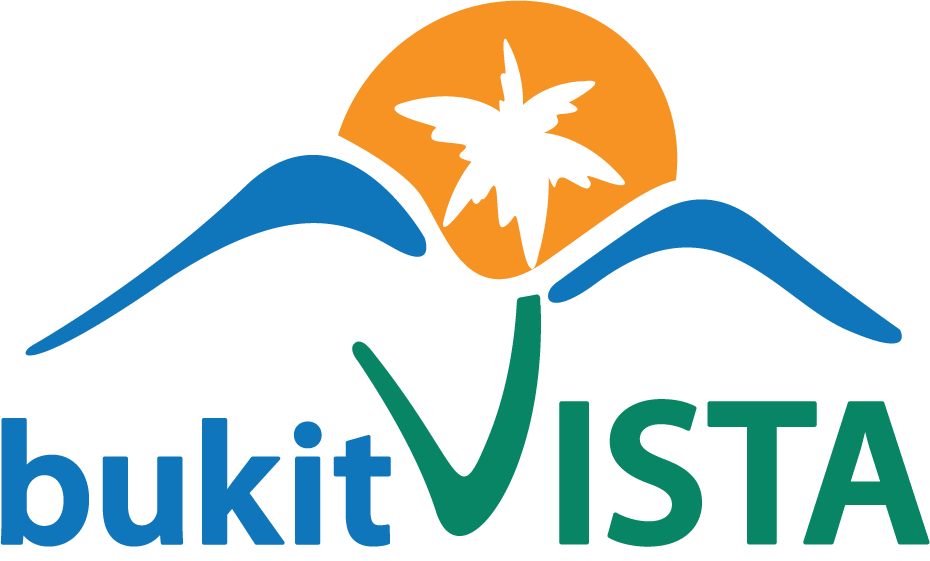In the bustling sphere of technology and tourism, a unique assembly unfolded within the collaboration of Tourism Bachelor Studies of Universitas Gadjah Mada (UGM) and Bukit Vista, bridging academic minds with practical industry insights of AI in Tourism. The guest lecture session, led by our VP of Marketing Gunung Ghania, unraveled a discourse on the dynamic intersection of tourism and technology. Accompanied by me, Dea Novita from PR team of Bukit Vista, this topic particularly emphasizing the transformative “Tourism Revolution” propelled by technological advancements.
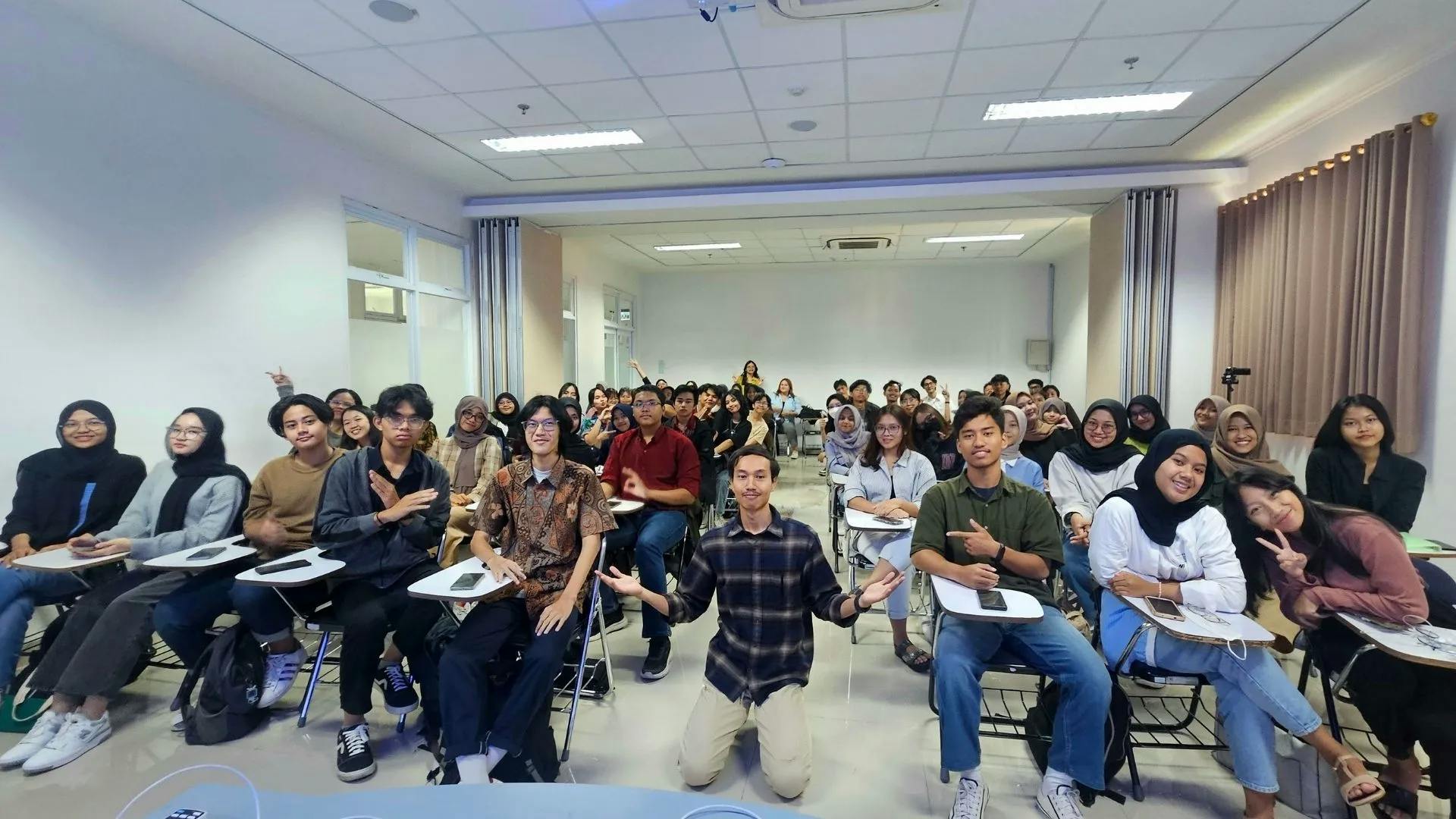
Empowering Learning through Socratic Discussions
The highlight of this discourse was the implementation of a Socratic method, fostering a two-way communication channel that not only encouraged participants to critically engage with the material but also to confidently voice their unique perspectives and solutions. This approach not only democratized the learning environment but also underscored the value of mistakes as learning opportunities, and challenging conventional pedagogical methods.
With the Socratic method, the discussion is far away confined to the rigidity of a lecture, but rather designed as a series of engaging discussions, spotlighting the importance of technology in reshaping the tourism landscape. It underlined the critical role of academic strategists in harnessing technology to elevate Indonesia’s tourism industry. The discourse, rich with real-life implications and future-forward strategies, delved into the essence of critical thinking, collaborative discussions, and the courage to embrace innovative ideas for industry advancement.
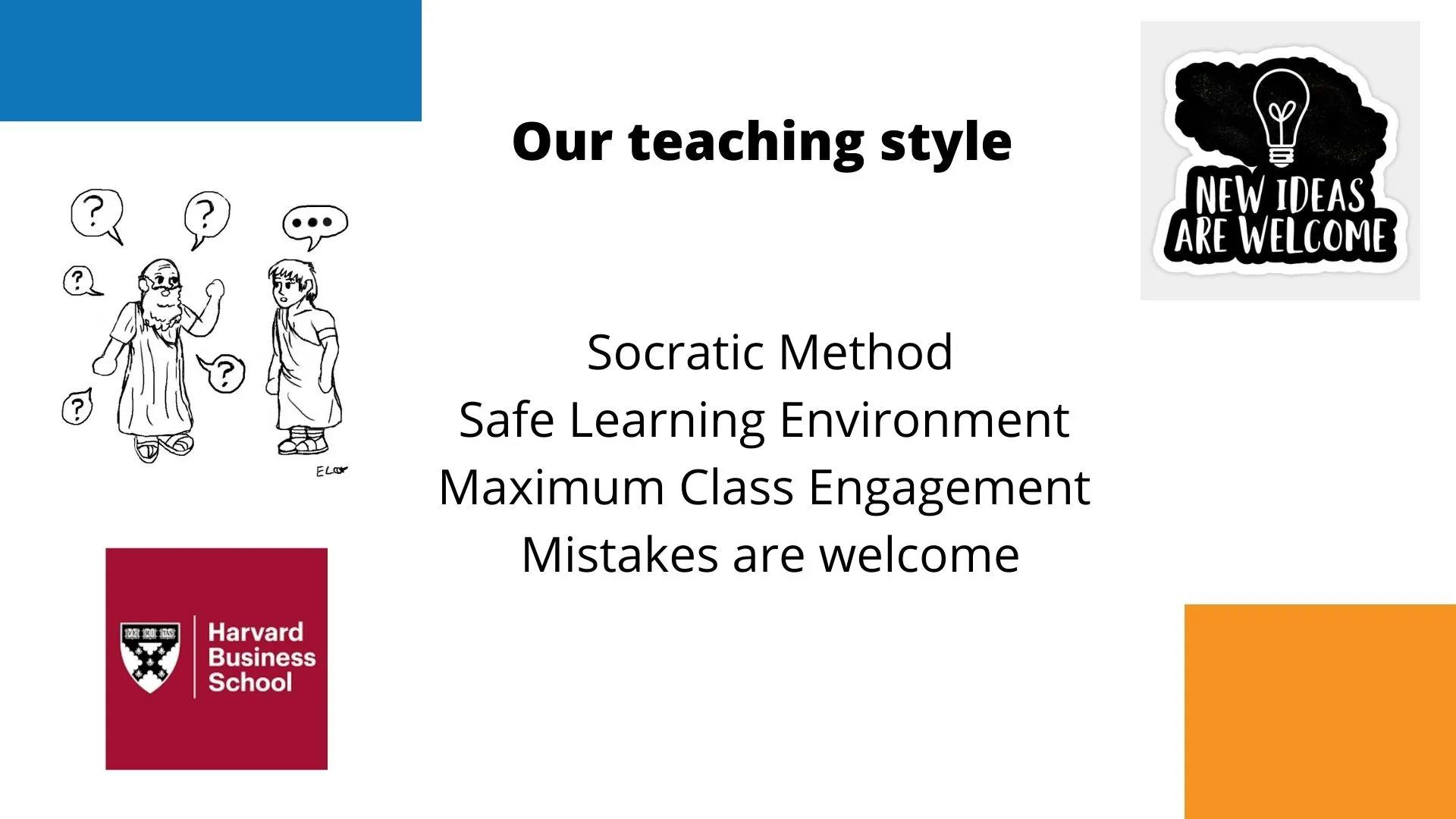
AI’s Dual-Edged Sword: Redefining AI in Tourism Sector
The lively debate around the impact of AI on the job landscape in the tourism sector sparked insightful contributions from participants Jihan, Adit, and Dian. Jihan argued that AI could lead to job reduction within the tourism industry, particularly through online travel agencies (OTAs) which might replace blue-collar roles. Adit offered a nuanced perspective, suggesting that while AI might decrease the demand for front office and customer service positions, it could simultaneously bolster mental health by reducing direct customer interactions. Adit also noted the potential for AI to extend shift times and mentioned the existence of robot hotels in Japan as a reference point.
On the other hand, Dian highlighted the dual nature of AI’s impact: while it necessitates regular service and maintenance—potentially boosting jobs in science and technology sectors—it could also reduce customer service roles by replacing them with chatbots. Dian’s observation points to a shift towards business development roles within the tourism academic pathways.
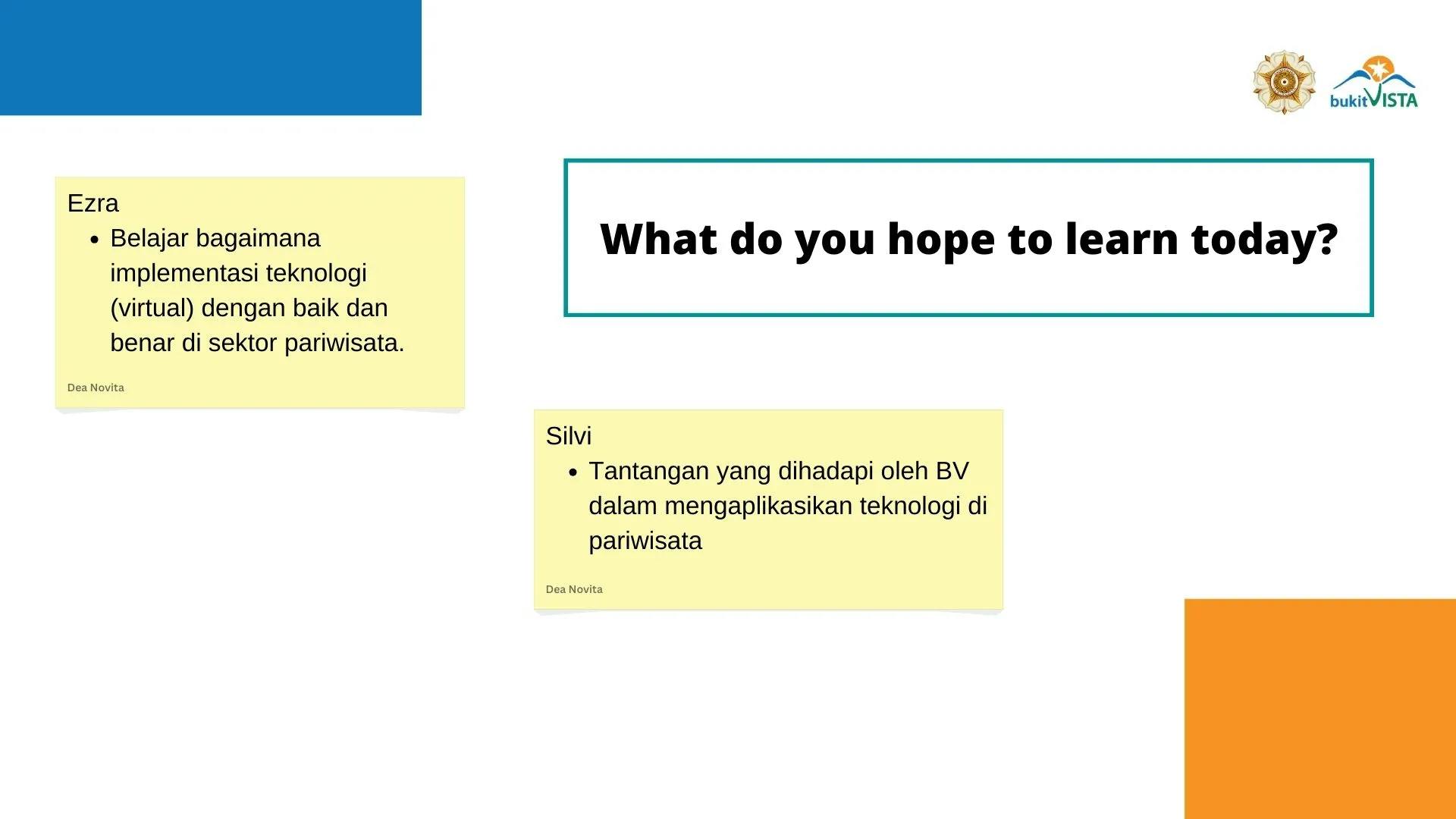
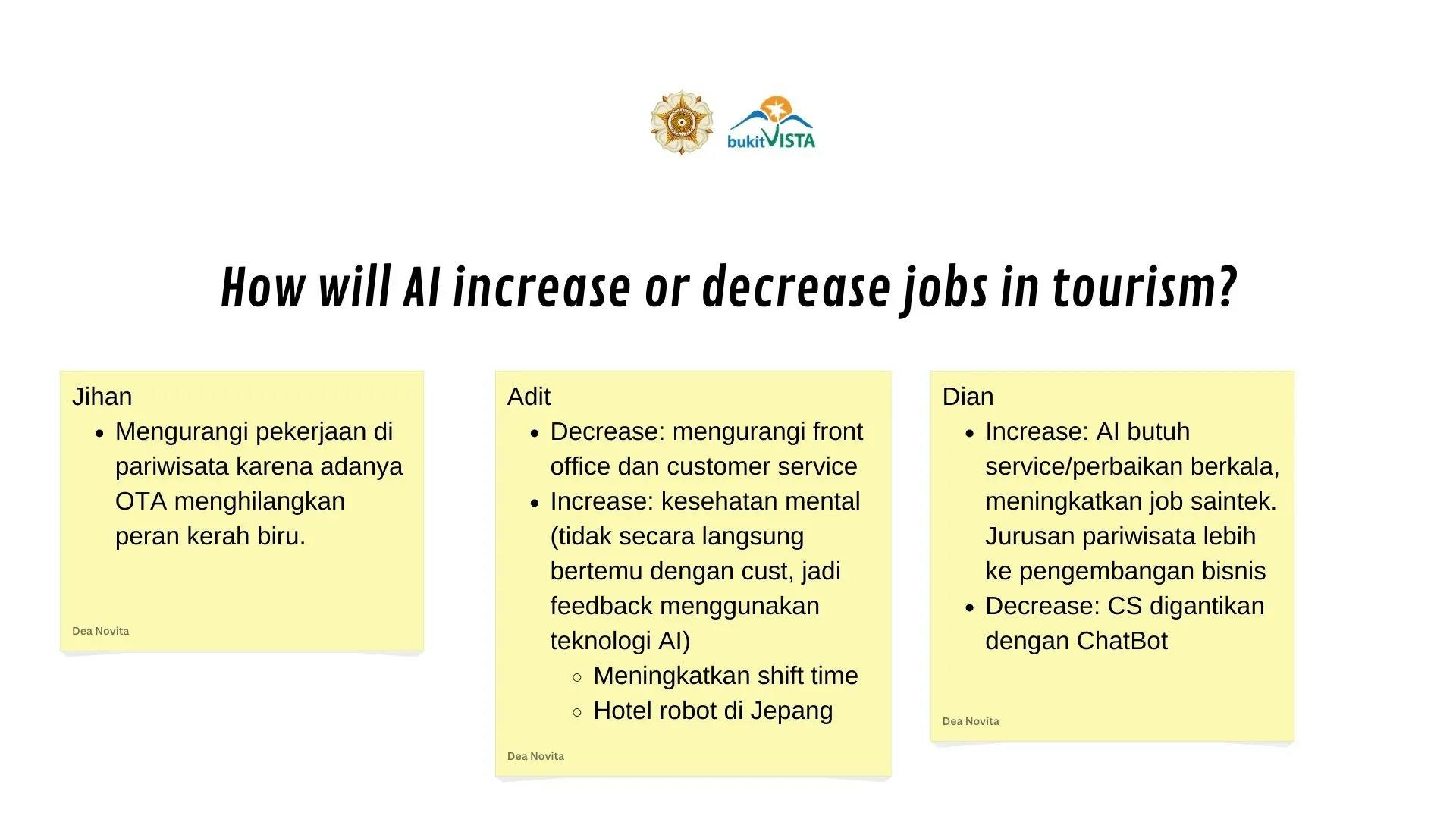
Navigating Challenges in the Tourism Industry with AI
Case Study
Gunung Ghania presented a case study that thrust the attendees into the throes of a high-season hotel chaos scenario. As part of their learning, students were tasked with navigating the tumultuous waters of hotel management during peak times, confronting the challenge head-on: A hotel inundated with 100 bookings per day, a predominantly greenhorn reservation team, and a wave of guest dissatisfaction due to service mishaps.
The participants’ ingenuity shone through their suggestions, which were showcased on virtual sticky notes, encapsulating the blend of preemptive and reparative strategies. The attendees, identified by their first names, put forward a variety of innovative solutions, reflecting a profound understanding of the operational complexities within the hospitality industry.
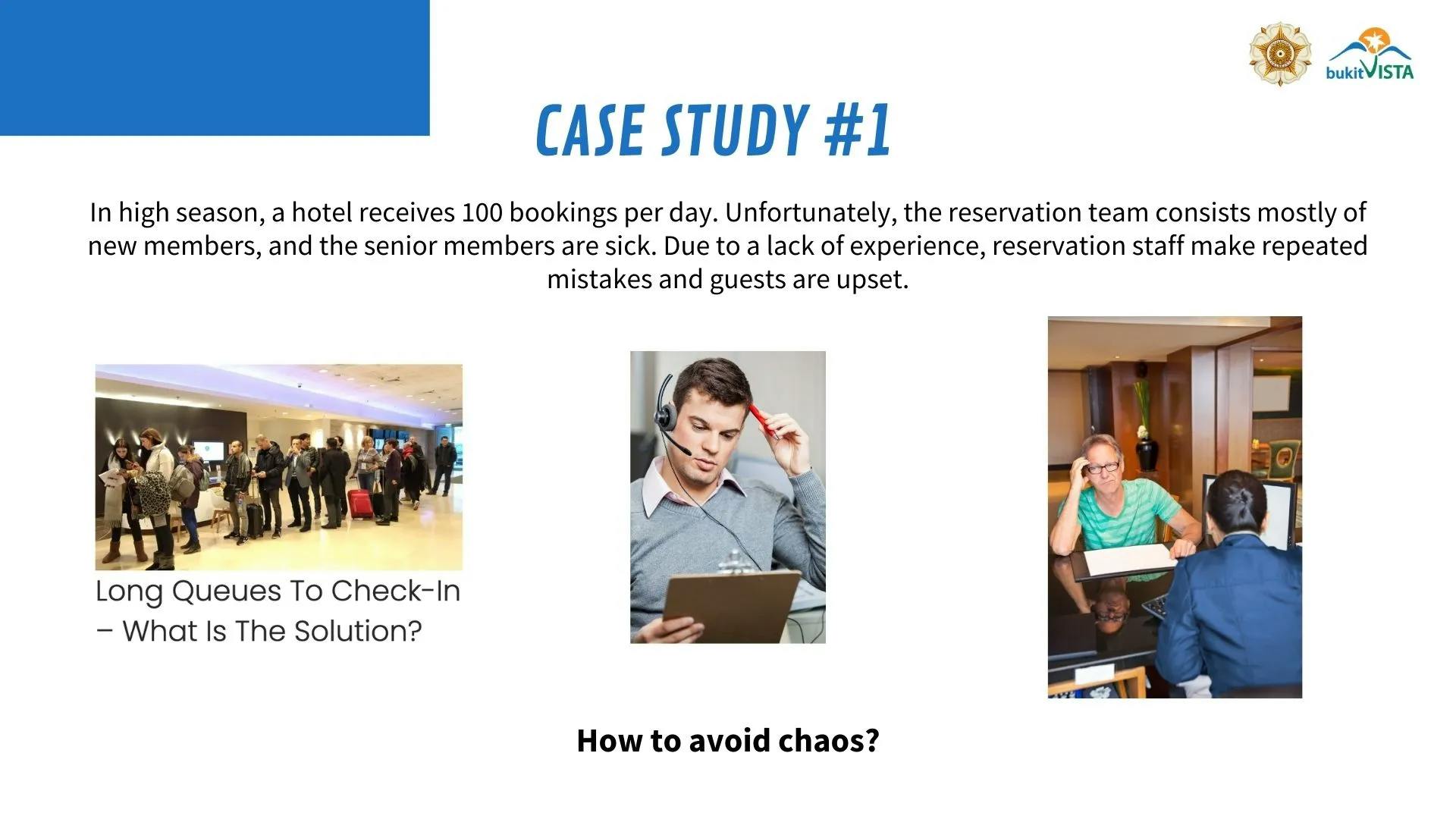
Cinta underscored the necessity of training junior staff with seasoned professionals, advocating for hands-on learning and direct management involvement to alleviate the immediate stress and bolster the on-site team’s capabilities. This approach not only aimed to enhance staff proficiency but also envisioned transforming a potential crisis into a powerful learning experience.
Ezra took a tech-savvy stance, suggesting the utilization of Google Translate and other AI technologies for on-the-spot problem-solving and enriching the junior staff’s toolkit with these digital aids. This reflected a recognition of the role technology plays in augmenting human resources, especially when traditional methods are stretched thin.
Faiza proposed a customer-centric approach, recommending the extension of goodwill gestures, like complimentary services, to soothe ruffled guest feathers. Furthermore, Aurel’s proactive solution was to drill the junior staff in standard operating procedures, preparing them in advance for the high-tide of hotel operations. They also emphasized the importance of responsive post-event actions, suggesting that the hotel must actively engage with customer reviews and feedback to continuously improve their services.
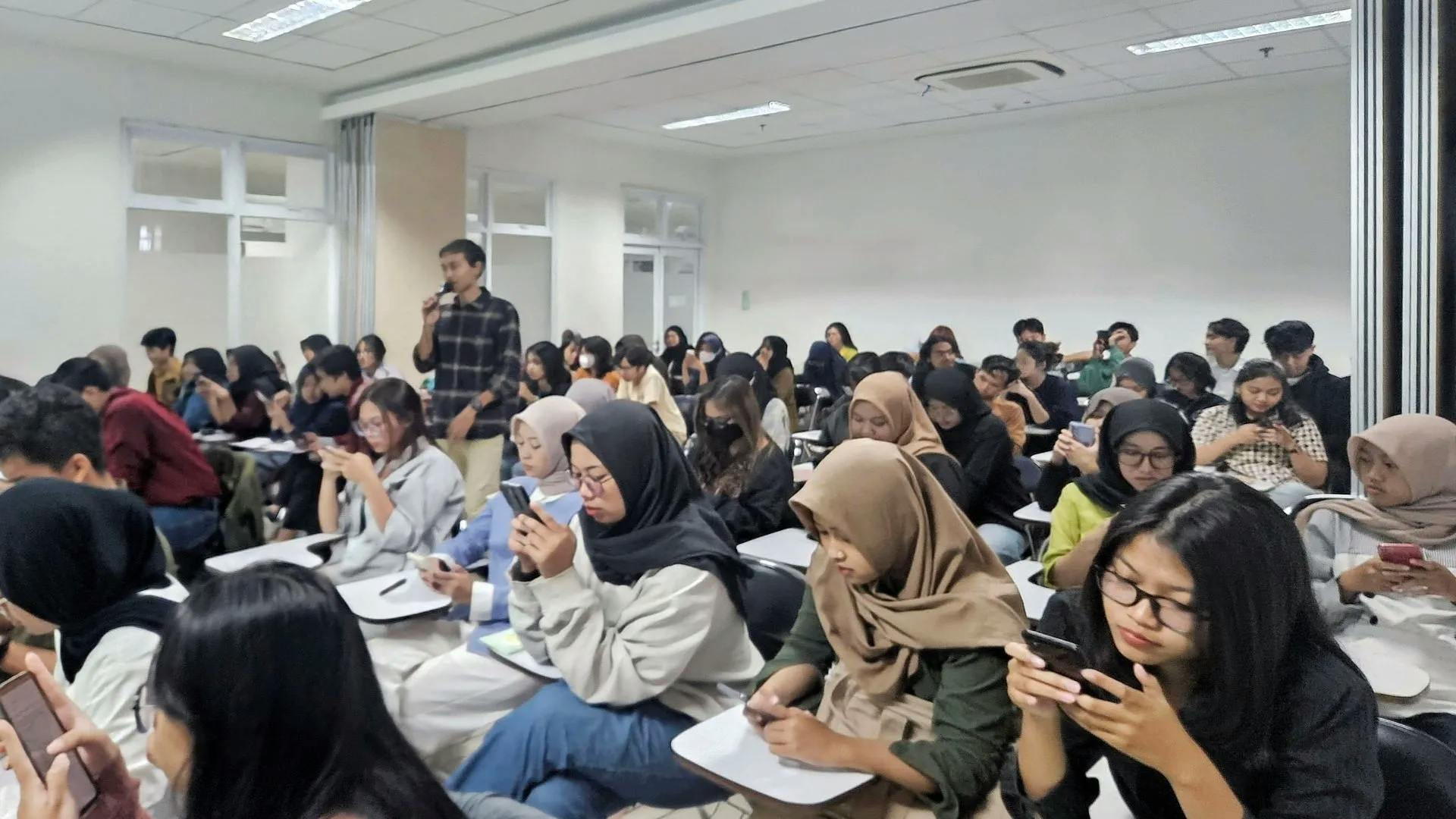
Bukit Vista’s AI Solution
A tale of innovation unfolds as Gunung Ghania introduces GAIA – a sophisticated AI assistant leading a brigade of AI solutions transforming traditional hospitality practices into modern marvels. The traditional hospitality method begins with the familiar scenes of conventional hospitality – manual check-ins, physical ticketing, and customer service representatives immersed in their diligent but often monotonous tasks. Enter GAIA, an emblem of progression, symbolizing the shift to a self-check-in system where guests are greeted not by lines but by seamless automation, personified in a friendly, illustrated avatar.
But GAIA isn’t alone. Accompanying her are specialized AIs, each with a distinct purpose, collectively orchestrating a symphony of efficient hospitality services. IRIS enhances partner relationships with intuitive communication. ATHENA, the responsive AI, diligently manages review replies, ensuring every guest feels heard. APOLLO, the evaluator, seamlessly appraises property values, encapsulating the depth of Bukit Vista’s commitment to leveraging technology for exceptional service delivery.
These AI entities are more than just tools. They’re the embodiment of Bukit Vista’s forward-thinking ethos – an integrated suite of digital innovations tailored to cater to every facet of the guest experience. From a warm virtual welcome to insightful property evaluations, each AI component is a cog in a well-oiled machine, propelling the tourism industry into a future where convenience, efficiency, and personalization reign supreme.
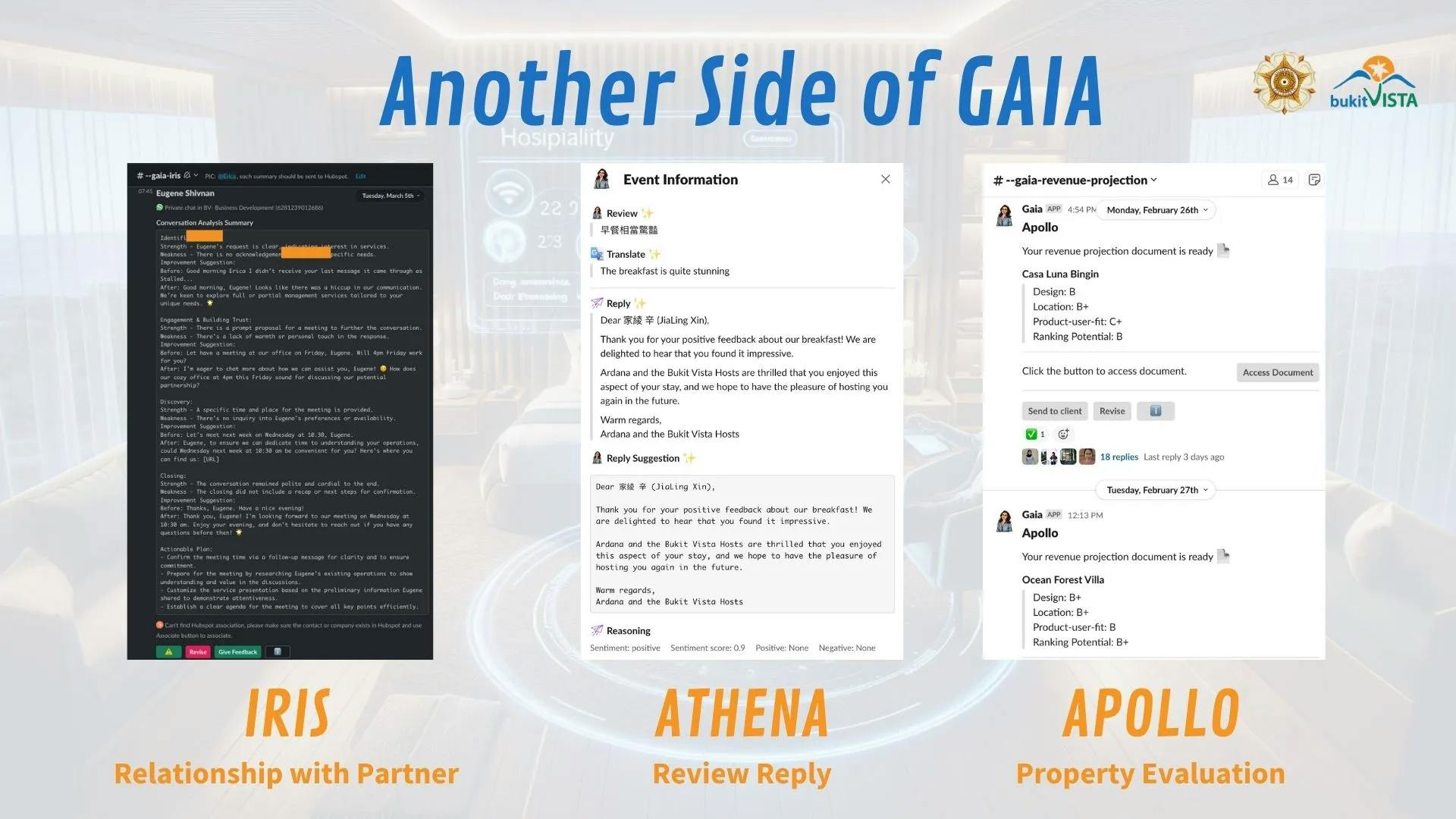
From Traditional to Modern: AI Impacts in Tourism
Amidst the growing integration of AI in various sectors, the tourism industry is experiencing a revolutionary shift, much of which is championed by thinkers like Gunung Ghania. Ghania suggests that AI doesn’t just streamline operations—it’s reinventing the sector’s human touch.
In a recent exploration of this transformation, Ghania pointed out that AI is phasing out the more monotonous tasks in tourism. This shift isn’t about job displacement; it’s about enhancing the quality of life for tourism workers. By automating routine processes, workers are now able to engage more deeply with guests, crafting memorable experiences that a machine could never replicate. It’s the warmth of a welcome, the personal touch in a recommendation, and the attentive service that defines quality in hospitality.
The AI systems, capable of storing and processing vast amounts of information, serve as the perfect back-office assistants that never forget a detail. They ensure that the wealth of knowledge within an organization is at the fingertips of those who need it—freeing up human workers to do what they do best: connect, understand, and create experiences that resonate on a personal level.
As AI assumes roles like ticketing, check-ins, and customer inquiries, it allows human employees to focus on areas requiring emotional intelligence and creative problem-solving. For instance, concierge services can now spend more time personalizing guest experiences rather than handling keys or registration forms. Tour guides are able to provide more engaging narratives without the burden of administrative overheads. The roles of humans in tourism are thus elevated, allowing for career paths that are rewarding both intellectually and emotionally.
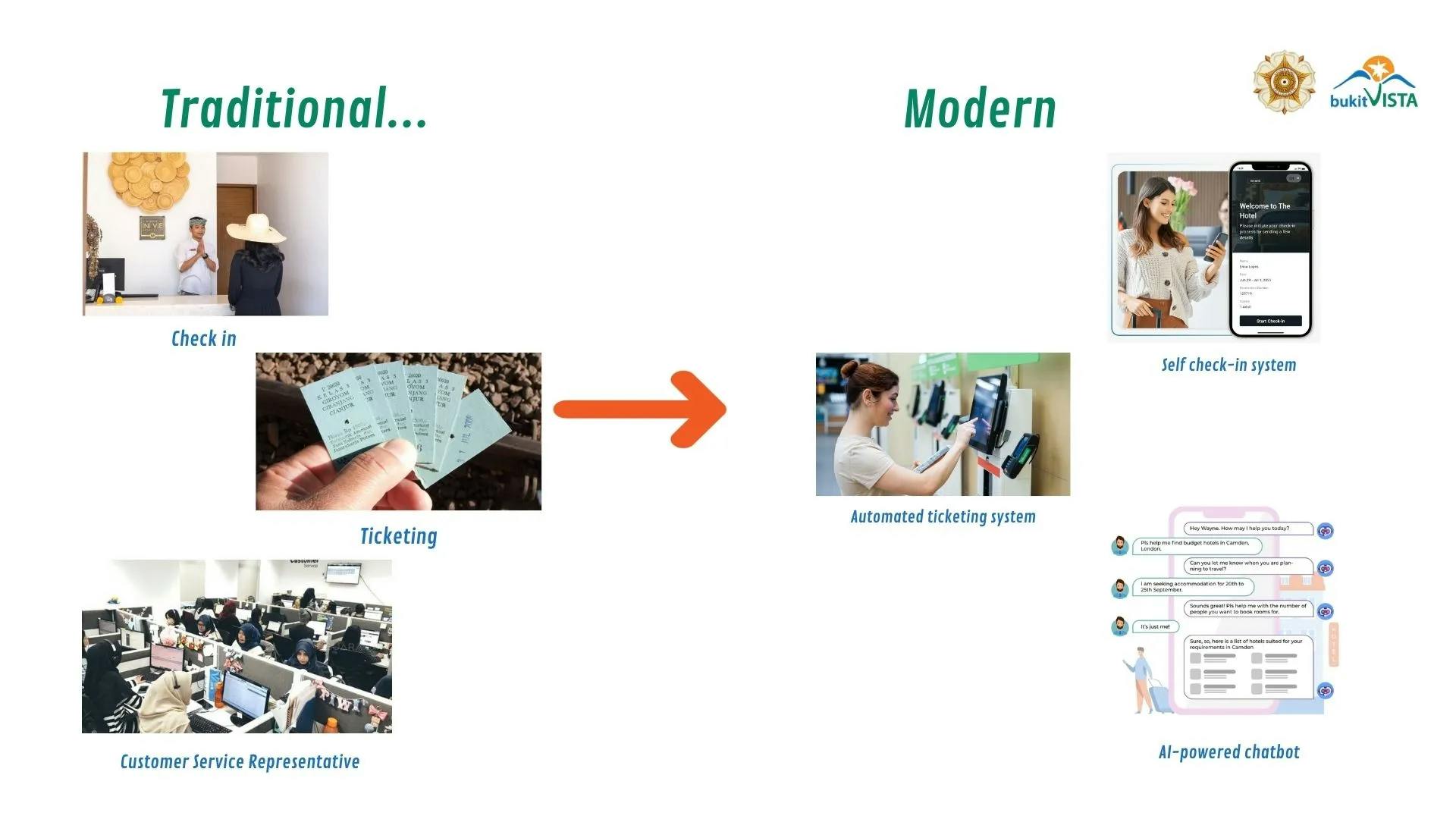
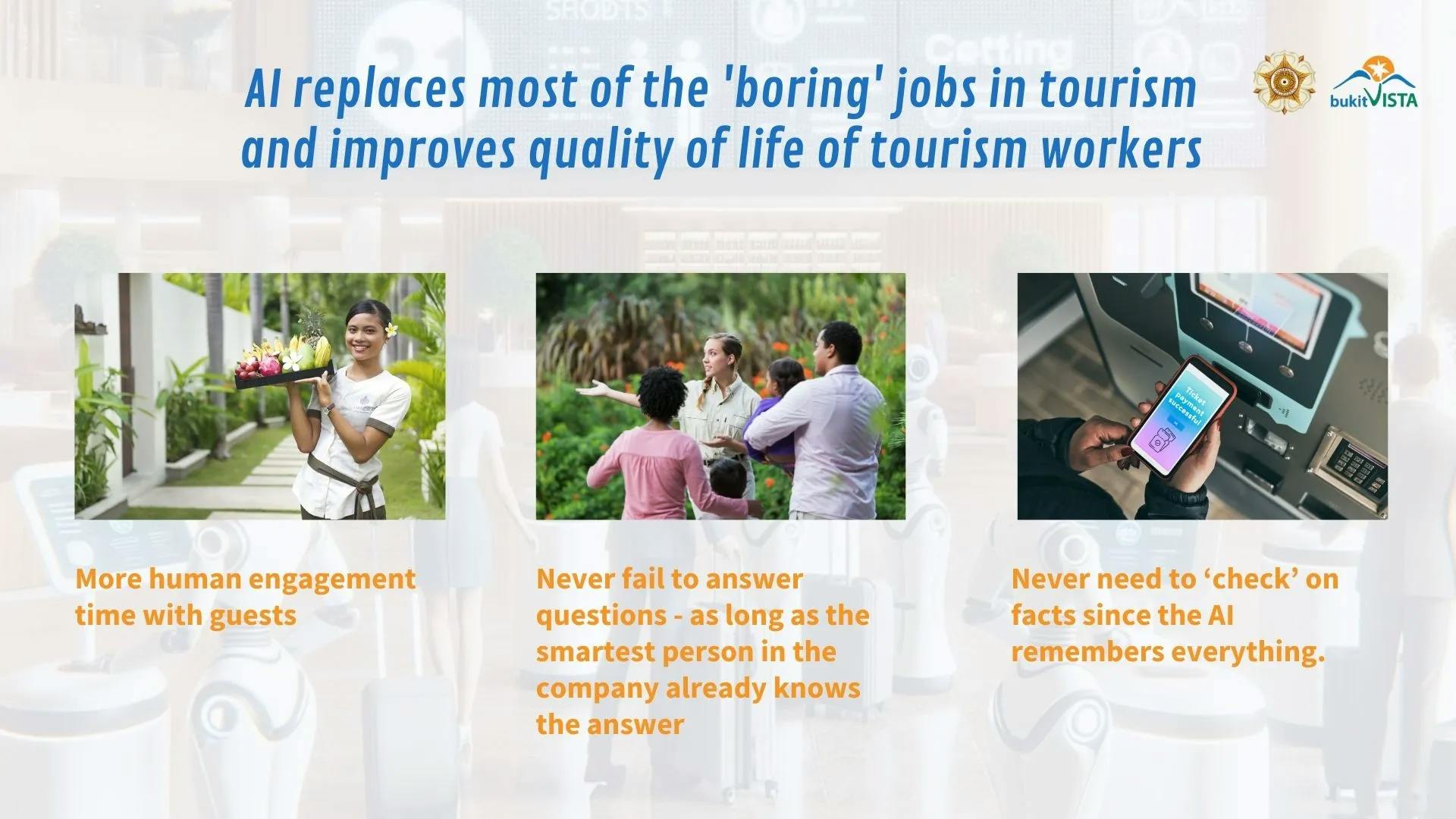
Mastering Knowledge Management in Tourism
Case Study
At the stroke of 1 AM, when most of the world sleeps, the hospitality industry often faces its true test. Picture this: The front desk of a hotel bustling with guests in the middle of the night, a WIFI issue arises, testing the patience of guests and the mettle of the hotel staff. This was the dilemma presented by Gunung Ghania in the second case study for tourism studies students.
Ghania’s solution emphasizes the power of knowledge management within an organization. Enter ‘Ask-Anything,’ an internal communication platform that’s much more than a repository of information. It’s a lifeline for employees, especially when the engineer is home, and the WIFI plays truant.
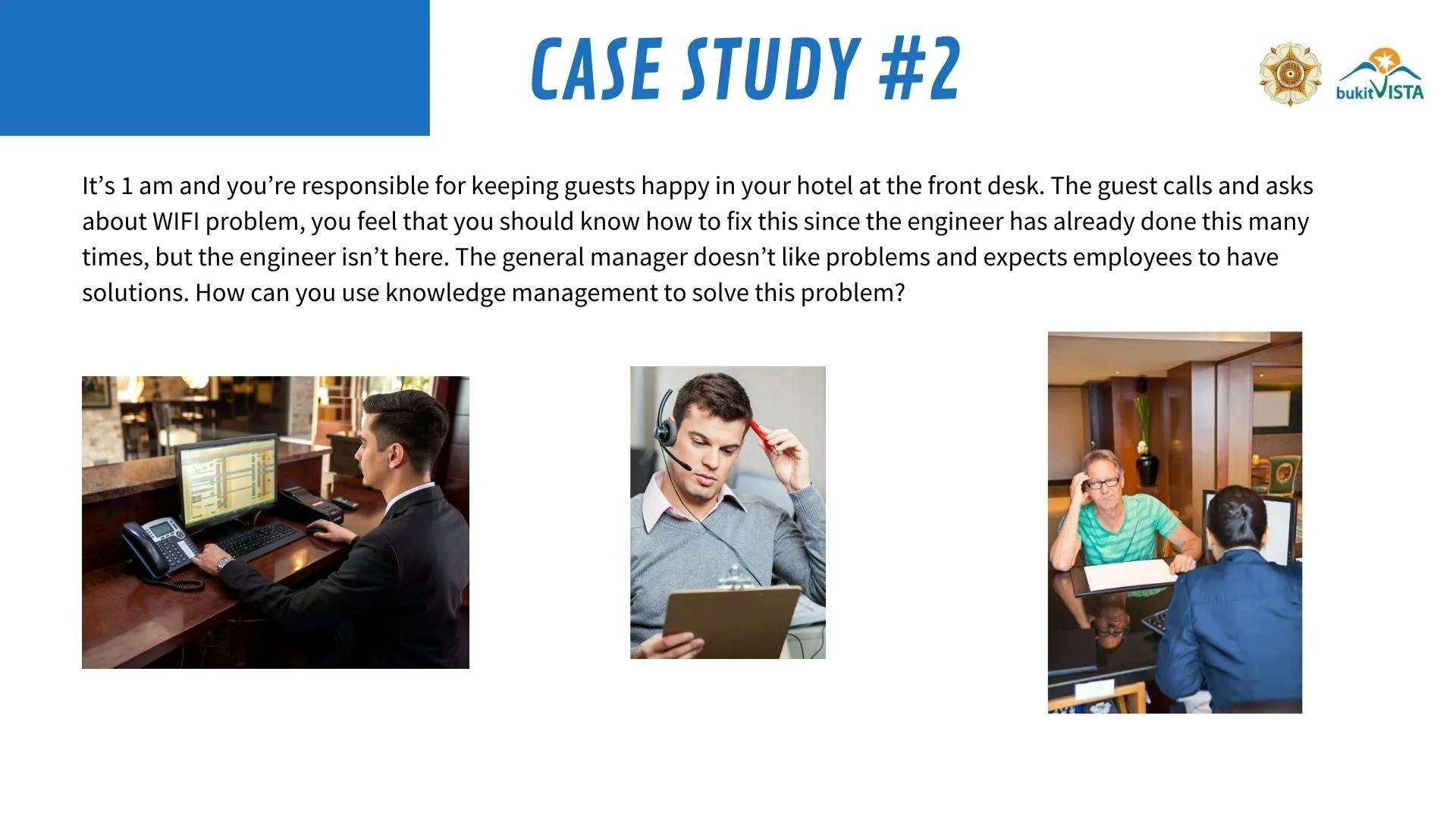
AI’s Role in Solving Real-Time Hospitality Hurdles
‘Ask-Anything’ becomes the go-to for the night-shift front desk agent who’s suddenly the hero everyone is relying on. It’s digital collective wisdom where every query about lockboxes, WIFI troubleshooting, guest concerns, and transport prices has been asked and answered. The staff types in their question, and like magic, they’re not alone; the shared experiences of their colleagues are there to guide them.
Through this innovative channel, Ghania not only provides a tool but also creates a culture of collaborative problem-solving. It’s a scenario where Dio, Zulfi, and Clara—hotel employees—are empowered by the collective know-how of their organization. They can appease guests with explanations, suggestions to move to areas with stronger WIFI, offer compensations, and even utilize backup modems if necessary. And when the WIFI is back up, there’s a feeling of triumph—not just for the guests but for the entire team that worked together virtually.
This is a future-forward approach where the focus is not merely on solving a problem but transforming it into an opportunity for seamless service and employee empowerment. Gunung Ghania’s ‘Ask-Anything’ exemplifies that the essence of modern hospitality isn’t just about the individual brilliance but a communal knowledge ecosystem that stands vigilant, ready to tackle any challenge, at any hour.
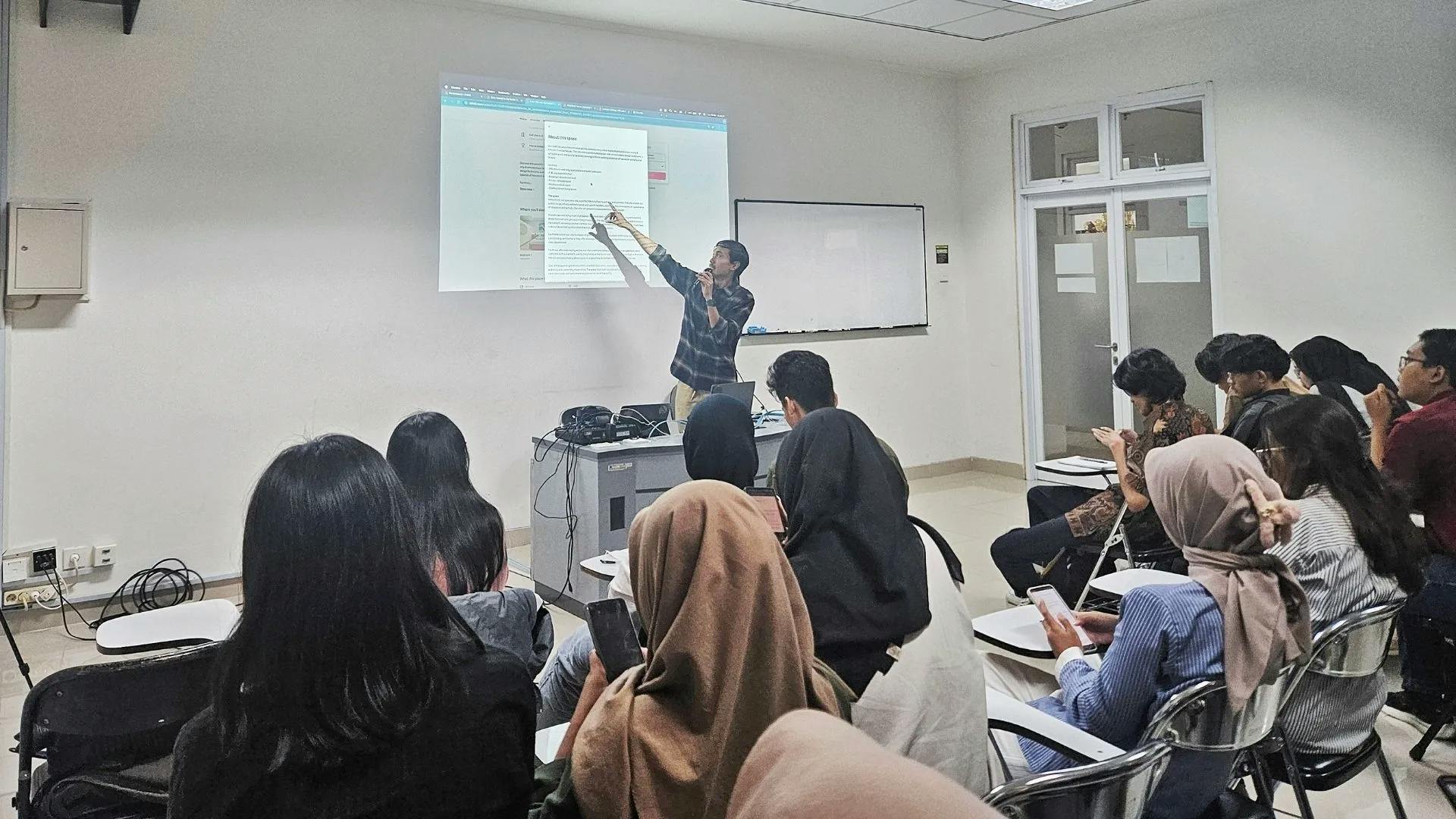
So, What AI Can’t Do?
In the journey toward progress, machines may pave the roads, but it’s the human spirit that will chart the course and tell the tale. Through his case study and the accompanying visual aid, Ghani delineated a triad of AI’s limitations.
- Firstly, while AI can process information, the translation of data into knowledge—a nuanced, contextual understanding—is inherently a human trait. AI lacks the ability to discern the subtleties of human experience and wisdom that come from making connections between disparate pieces of information.
- Secondly, AI’s inability to self-prompt or initiate actions without external input stands out. It doesn’t possess the human spark of curiosity or the impetus to ask new questions, seek out unknown information, or explore uncharted territories without being programmed to do so.
- Lastly, the art of storytelling, with its intricate blend of emotion, tone, and timing, remains untouched by AI. While AI can generate narratives based on given parameters, it cannot genuinely understand or convey the essence of a story that resonates on a human level.
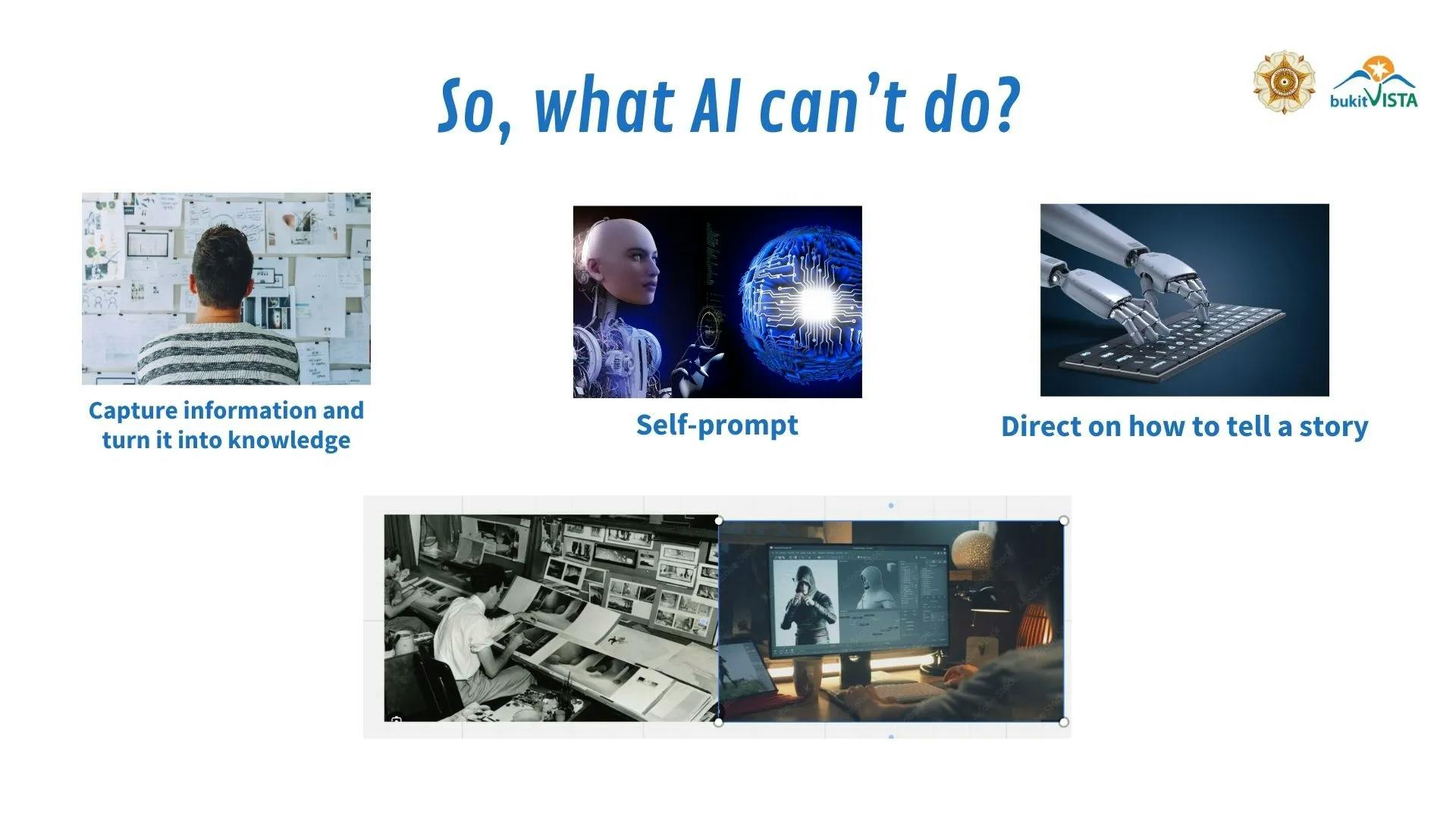
These insights from Ghania’s teachings provide a sobering reminder of the symbiotic relationship between humans and AI. AI’s boundaries are not just constraints but opportunities for human skills to shine, ensuring that the heartbeat of the tourism industry remains profoundly human.
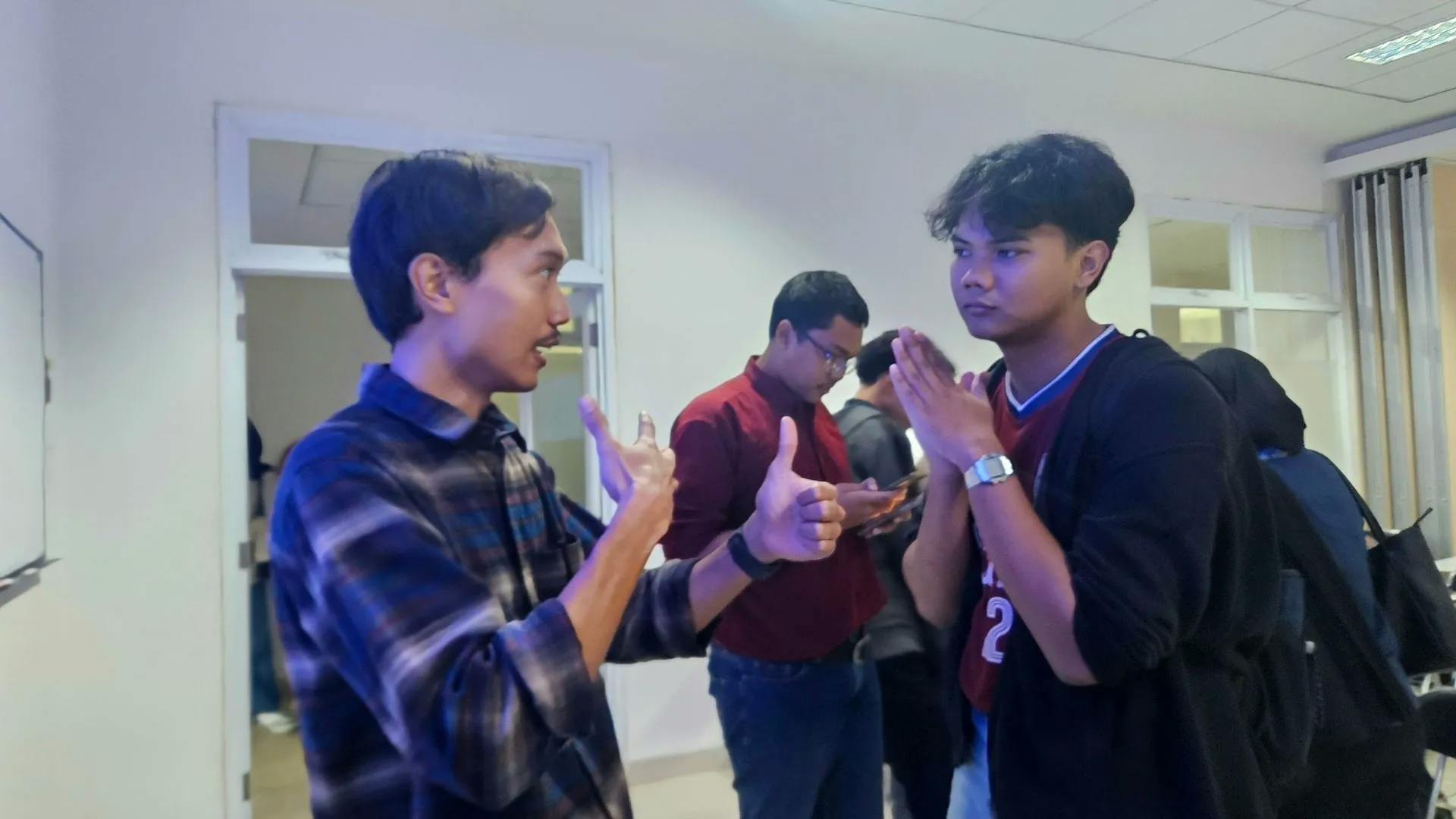
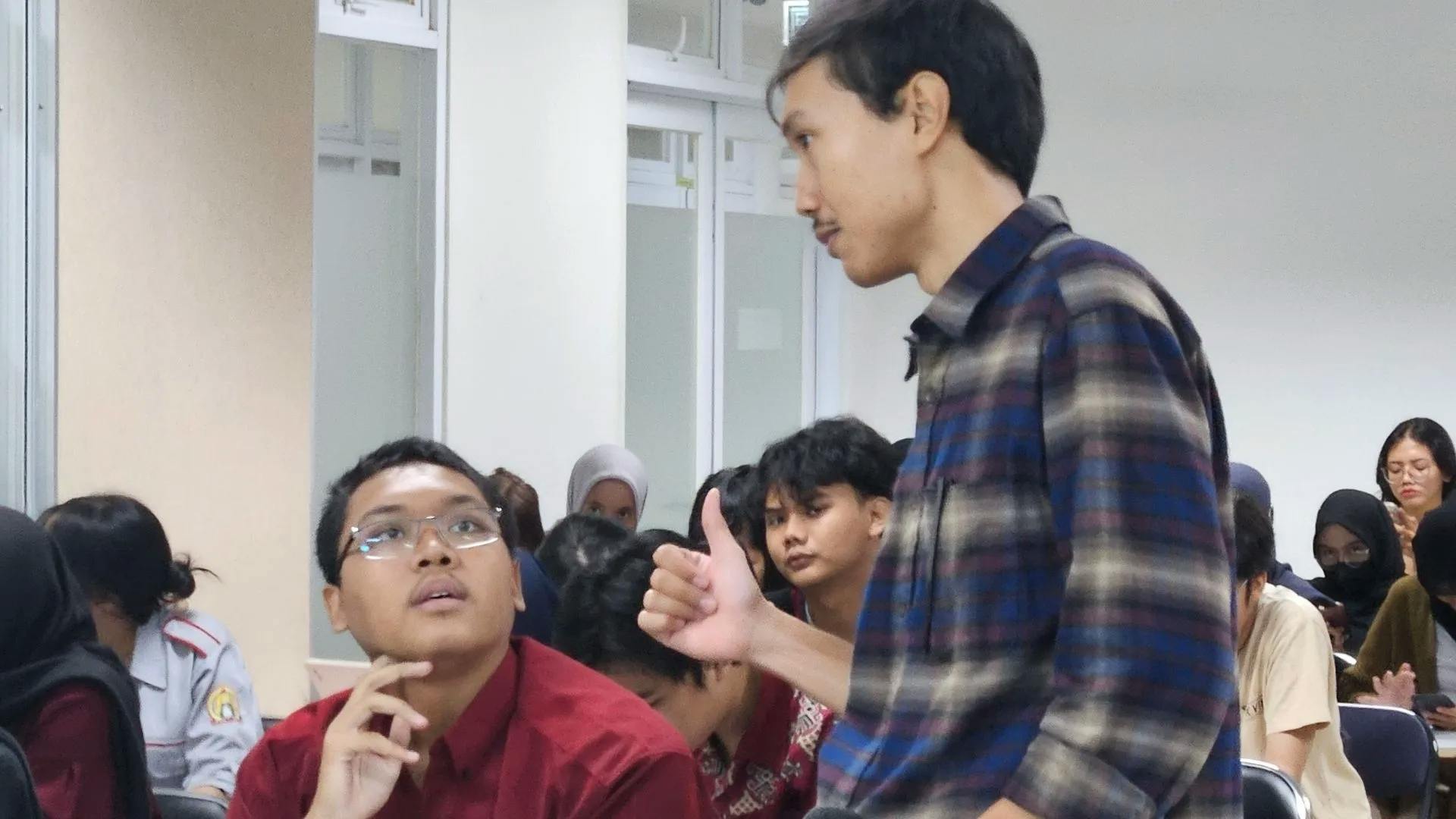
As the guest lecture by Gunung Ghania drew to a close, the room buzzed with an undercurrent of fresh ideas and renewed inspiration. The insightful session concluded with a vibrant Q&A, where the inquisitiveness of the students was palpable. The questions posed by the audience ranged from the practical applications of AI in the tourism industry to the more philosophical inquiries about the interplay between technology and human interaction.
Conclusion
The insightful explorations and case studies presented by Gunung Ghania elucidate a key understanding: While AI serves as a powerful tool that can streamline operations and automate mundane tasks within the tourism industry, it’s the human element that truly drives innovation, personalization, and the rich storytelling that connects with guests on a deeper level.
At the core of Bukit Vista’s approach lies a balanced synergy between technology and human creativity. Their knowledge management system, Ask-Anything, stands as a beacon of collective intelligence, ensuring that every employee can offer service that is as informed as it is genuine.
Bukit Vista is not just leading the way in integrating AI into hospitality; they are defining how to complement it with the invaluable insights only humans can provide. If you’re looking to elevate your property’s guest experience or want to delve into the art of hospitality enriched by technology, reach out to Bukit Vista. Let’s share knowledge, harness the potential of AI together, and keep the essence of human touch alive in every interaction.
Contact Bukit Vista today for a partnership where tradition meets innovation, and every guest’s story is given a personal touch.
